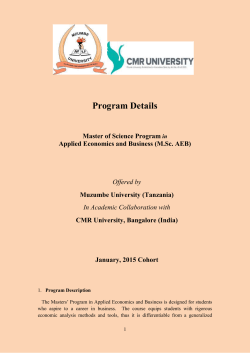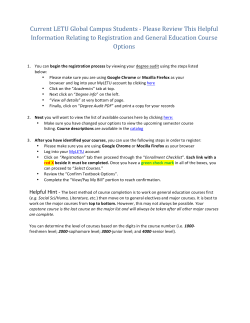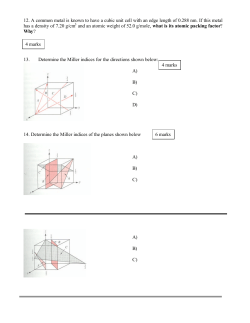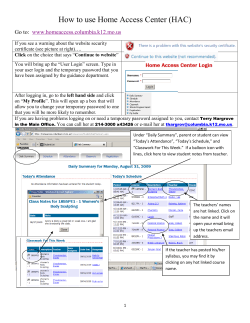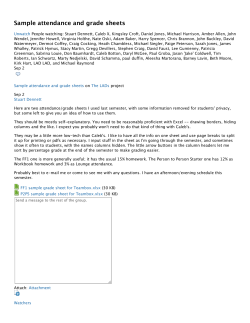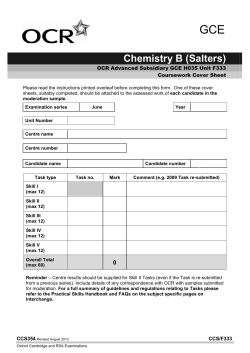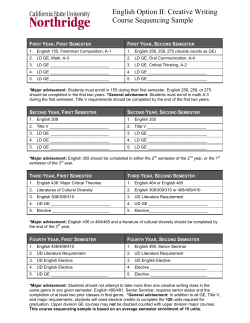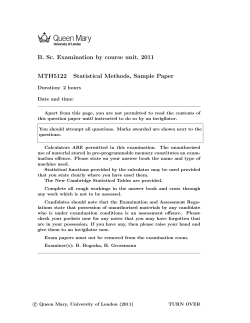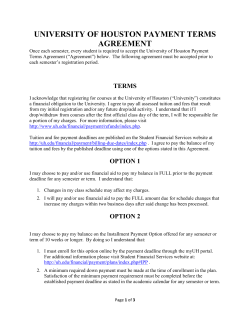
Syllabus and Course Scheme Academic year 2014-15
Syllabus and Course Scheme Academic year 2014-15 MASTER OF COMPUTER APPLICATIONS (MCA) UNIVERSITY OF KOTA MBS Marg, Swami Vivekanand Nagar, Kota - 324 005, Rajasthan, India Website: uok.ac.in MASTER OF COMPUTER APPLICATIONS (MCA) Exam. – 2015 Duration : 3 Years Eligibility : As per RMCAAT Guide Lines Selection: Through Entrance Examination(RMCAAT) Semester ( 1 to 5) 1. In each semester there shall be 5 theory papers and 4 practical. Each Theory as well as practical paper shall be of 100 marks. 2. As per the decision taken in the committee of the Deans of internal assessment the AICTE norms should be followed.. 3. Each theory paper consist of 100 marks out of which 75 marks shall be for external assessment and 25 marks for internal assessment. 4. For the award of internal assessment marks of each theory paper, 2 sessional tests per semester shall be conducted by the internal faculty of the University and award list should be sent to the Examination Section of the University. 5. Examination of 03 practicals of each semester be conducted by one external examiner. 6. Attendance must be 75% for appearing in each end semester examination. Yearwise/Semesterwise Passing Scheme First Year: 1.1 The minimum marks for passing first year ( I & II Semester taken together) shall be 40% in each theory paper (internal assessment and external assessment separately ) and 50 % marks in the aggregate of papers prescribed in I and II semester (theory and Practical separately). 1.2 A candidate may be promoted to second year if he/she has secured at least 40% marks in each theory paper but has failed to secure 50% marks in aggregate ( theory and practical separately). He/She shall be required to reappear in some of the theory papers of I and II semester so as to make his/her aggregate at least 50% along with papers of III, IV, V, VI semester when these course are offered again so as to satisfy the passing criteria laid in 1.1. 1.3 A candidate may be promoted to second year if he/she secured at least 40% marks in at least seven out of ten theory papers prescribed in I & II semester taken together provided that the aggregate of marks in all theory papers of I and II semester taken together is at least 50%. Such a candidate shall be required to reappear in papers in which he/she has secured less than 40% marks alongwith the theory papers of II,III, IV, V, VI semester when these courses are offered again so as to satisfy the passing criteria laid in 1.1. 1.4 A candidate appearing in first and then in second semester of MCA course, that is treated as first year of the course, may be promoted to third semester, if he/she passes 50% papers of theory as well as practical papers separately. Otherwise he/she will be treated as failed and he/she will have to re-appear as ex-student in all papers of first year. Due papers, if any, will have to be passed alongwith third & fourth semester. 1.5 A candidate who fails to satisfy the passing criteria in 1.1, 1.2, 1.3 for promotion to second year shall be required to rejoin the course in the first year, if otherwise eligible in accordance with the University regulation laid in this regard. Second Year: 2.1 The minimum marks for passing second year (III & IV semester taken together) shall be 40% in each theory paper (internal assessment and external assessment separately) and 50% marks in the aggregate of theory papers prescribed in III and IV semester (theory and practical paper separately). 2.2 A candidate may be promoted to third year if he/she has secured at least 40% marks in each of the theory papers but has failed to secure 50% marks in aggregate (theory and practical papers separately) such a candidate shall be required to appear in some of the theory papers of III, IV so as to make his aggregate at least 50% along with theory papers of V and VI. 2.3 A candidate may be promoted to third year if he/she secured at least 40% marks in atleast sixteen out of twenty theory papers prescribed in I, II, III & IV semester and has secured 50% in aggregate of theory papers in semester III and IV taken together. Such a candidate shall be required to reappear in some of theory papers in which he/she has secured less than 40% marks along with the theory papers of V and VI semester. 2.3 Similarly for promotion in fifth semester, a candidate has to pass 50% papers of first year (I and II semester taken together) and second year (III and IV semester taken together) in theory as well as practical papers separately, otherwise he/she will not be promoted to fifth semester. He/she then will have to reappear in due papers of first, second, third and fourth semester as an Ex-student. 2.4 A candidate promoted to third year as per the conditions of rule 2.3 above, will be allowed to appear in due papers of first and third semester alongwith fifth semester. Similarly, he/she may appear for due papers of second and fourth semester alongwith his sixth semester that is a project work. 2.5 A candidate who fails to satisfy the passing criteria in 2.1, 2.2, 2.3 for promotion to third year shall be required to rejoin the course in the second year, if otherwise eligible in accordance with the University regulation laid in this regard. Third Year: 3.1 The minimum marks for passing third year ( V & VI Semesters) shall be 40% in each theory paper (internal assessment and external assessment separately ) and 50 % marks in the aggregate of papers prescribed in V semester (theory and practical separately) and candidate should get 50% external assessment and internal assessment of the Minor project and 50% marks in semester VI. 3.2 if a candidate has secured less than 50% marks in the aggregate of theory papers of semester V, he/she is required to appear in theory papers in the following semester examination so as to satisfy the passing criteria laid in 3.1. 3.3 if a candidate has secured less than 50% marks in both internal assessment and external assessment of VI semester project he/she will repeat the project semester (VI semester). 3.4 A candidate who fails to satisfy the passing criteria in 3.1 and 3.2 at end of VI semester or study, he/she shall be required to rejoin the course in the third year. 3.5 At the end of final examination, the candidate eligible for the award of MCA degree shall be classified on the basis of the marks obtained in all the semester examination taken together, as follows: a. 1st Division with Honours: 75% or more marks is aggregate (provided the candidate has passed all the papers and examination in the first attempt) b. 1st Division: 60% OR more marks but fails the criteria for being classified as first division with honours laid in 2 (a). c. 2nd Division: all other not included in 4 a and 4 b above. 3.6 Maximum time limit permissible to complete MCA course is six years only since the year of his/her first admission to MCA course. 3.7 Degree of MCA will be awarded to such candidates who clear all the papers of MCA course within the period of six years. (i.e. the maximum duration to complete MCA course is six years) CURRICULUM AND SCHEME OF EXAMINATION MCA Course details the list of papers to be offered for the Master of Computer Application (M.C.A.) and the scheme of examination is given below: MASTER OF COMPUTER APPLICATION - (2015) 1. 2. 3. Duration of the Course: The M.C.A. course will be of six semesters duration which will be conducted in three years. Each semester will be having 90 working days in a semester duration. Medium of Instruction: The medium of instruction and examination shall be English. Courses of Study and Examination Scheme Theory: I. Assignments: 40% of the internal assessment marks for each theory paper will be awarded on the basis of performance in the assignments regularly given to the students, and its records. II. Internal Examination: 40% of the total Internal Assessment marks for each theory paper will be awarded on the basis of performance in written examination conducted by the faculty, one at the end of fourth month and another at the end of eighth month. III. Seminar/Oral examination: 10% of the total internal assessment marks for each paper will be awarded on the basis of performance either in a seminar or internal viva-voce. IV. Overall performance: 10% of the total internal assessment marks will be awarded for each paper on the basis of performance and conduct in the classroom. Practical : 1. Project: 80% of the total Internal Assessment Marks for each practical paper during I & II year and Vth sem. will be awarded on the basis of project, its presentation and project report submitted by the students. This activity can be held in the team of maximum two students. There should be a project co-ordinator (faculty member of computer science department). 2. Internal examination: 10 % of the total Internal Assessment marks for each practical paper will be awarded on the basis of performance in practical examination conducted by the faculty, once during the session. Overall performance: 10 % of the total internal assessment marks will be awarded for each practical paper on the basis of performance and conduct in the practical labs. Semester: I Sr. no Subject Code Paper Name T P Internal Assessment Uni. Exams Total L Periods 3 1 0 25 75 100 3 3 3 3 1 1 1 1 0 0 0 0 25 25 25 25 75 75 75 75 100 100 100 100 6. 7. Theory Papers MCA- 101 Computer Organization and Architecture MCA- 102 Programming in C MCA -103 Financial Accounting MCA -104 Discrete Mathematics MCA -105 Database Management System Practical Papers MCA -106 Programming in C MCA- 107 Database Management System Lab 0 0 0 0 4 4 25 25 75 75 100 100 8. MCA- 108 0 0 4 25 75 100 15 5 12 200 600 800 1. 2. 3. 4. 5. Office Management Lab Total Semester: II Sr. no Subject Code Paper Name 7. Theory Papers MCA -201 Object Oriented Modeling and Programming MCA- 202 Data Structures MCA- 203 Computer Oriented Numerical Methods MCA- 204 System Analysis and Design MCA- 205 Data Communication and Computer Networking Practical Papers MCA -206 Object Oriented Programming and Data Structures Lab MCA- 207 Computer Oriented Numerical Methods Lab 8. MCA- 208 1. 2. 3. 4. 5. 6. Communication Skills Total Periods L T P Internal Assessment Uni. Exams Total 3 1 0 25 75 100 3 3 3 3 1 1 1 1 0 0 0 0 25 25 25 25 75 75 75 75 100 100 100 100 0 0 4 25 75 100 0 0 4 25 75 100 0 0 4 25 75 100 15 5 12 200 600 800 Semester: III Sr. No. Subject Code Paper Name 6. 7. Theory Papers MCA-301 Programming with JAVA MCA- 302 Operating System MCA -303 Theory of Computation MCA- 304 Electronic Commerce MCA- 305 Information Security Systems Practical Papers MCA- 306 Java lab MCA- 307 Unix lab 8. MCA- 308 1. 2. 3. 4. 5. Seminar Total Periods L T P Internal Assessment Uni. Exams Total 3 3 3 3 3 1 1 1 1 1 0 0 0 0 0 25 25 25 25 25 75 75 75 75 75 100 100 100 100 100 0 0 0 0 4 4 25 25 75 75 100 100 0 0 4 25 75 100 15 5 12 200 600 800 Semester: IV Sr. no. Periods L T Internal Assessment Uni. Exams Total P 3 3 3 3 3 1 1 1 1 1 0 0 0 0 0 25 25 25 25 25 75 75 75 75 75 100 100 100 100 100 6. 7. Subject Paper Name Code Theory Papers MCA- 401 Computer Graphics MCA- 402 Software Engineering MCA- 403 Emerging Web Technologies MCA- 404 Artificial Intelligence MCA- 405 Elective:- 1.Embedded System Design 2.Parallel Processing Practical Papers MCA- 406 Computer Graphics Lab MCA 407 System design Lab 0 0 0 0 4 4 25 25 75 75 100 100 8. MCA- 408 Emerging Web technologies Lab 0 0 4 25 75 100 Total 15 5 12 200 600 800 1. 2. 3. 4. 5. Semester: V Sr. no. Subject Code Paper Name Periods Theory Papers MCA- 501 Design and Analysis of Algorithms MCA- 502 Wireless Technologies MCA- 503 Compiler Design MCA -504 Elective(I):- 1.Modeling and Simulation 2.Natural Language Processing 3. Distributed Computing 4. Software Project Management MCA- 505 Elective(II):- 1.Image Analysis and Compiler Vision 2 .Real Time System 3. Client-Server computing 4. Artificial Neural Network Practical Papers MCA -506 Algorithms Lab MCA- 507 Minor Project MCA -508 Elective Lab Total 1. 2. 3. 4. 5. 6. 7. 8. Internal Assessment Uni. Exams Total L T P 3 1 0 25 75 100 3 3 3 1 1 1 0 0 0 25 25 25 75 75 75 100 100 100 3 1 0 25 75 100 0 0 0 15 0 0 0 5 4 4 4 12 25 25 25 200 75 75 75 600 100 100 100 800 *Subject to the availability of faculty, (Elective will be offered only). Semester: VI (University- Industry Linkage- Programme) Sr.no Subject Code Paper Name Duration Internal Assessment Uni. Exams Total 1. MCA- 601 Major Project 6 Months 100 200 300 100 200 300 Total 1. Marks of internal Assessment can be distributed as follows:1. 2. 3. Project Performa sent by the student Mid term & end evolution from project guide synopsis of the project Total 20 30 50 100 2. Marks of University Exam can be distributed as follows:1. 2. 3. 80 80 40 200 Dissertation & Project Project Report Viva-Voce Total Total Marks of MCA VI Semester = Total Marks: 100 (Internal)+ 200(External) MCA I Semester MCA II Semester MCA III Semester MCA IV Semester MCA V Semester MCA VI Semester 800 800 800 800 800 300 Total Maximum Marks: 4300 Semester-III Programming with JAVA (MCA- 301) Unit I: An overview of Java, JVM, bytecode, Java class libraries, Date types, Variable, Data types and casting, Operators, operator precedence and Control statements. Unit II: Declaring object reference variable, Introducing methods, constructors, the key word, garbage collection, Overloading methods, String handling, and String buffer. Unit-III Inheritance and polymorphism: super class and subclass, protected members, Relationship between super and sub class. Inheritance hierarchy, abstract classes and methods, final methods and classes, nested classes, Packages and Interfaces: Defining a package, importing package, defining an interface, implementing and applying interfaces. Unit IV: Exception Handling: Fundamentals, exception types, using try and catch. File handling: Character based file and binary file, Multithreaded Programming: Creating a single and multiple threads , thread priorities, synchronization. Unit-V Applets: Applets basics, applets architecture, applets skeleton, the html applet tag, passing parameters in applets, event-handling: event classes and event listener interfaces, introduction to swing and servelets. Text/Reference Books 1. The complete reference Java - 2, P. Naughton and H. Schildt: Tata Mc-Graw Hill. 2. the java hand books, Patrick Naughton, Michael Morrison, Osborne/McGraw-Hill 3. A Desktop Quick Reference for Java Programmers, David Flanagan, Java in a Nutshell: O'Reilly & Associates, Inc. 4. Programming with Java A Primer, E. Balaguruswamy, TMH. 5. Big Java, Cay Horstmann, Wiley India edition, 2nd Edition. 6. Core Java, Dietel and Dietel, Pearson/Pretice Hall , 7th Edition. 7. Internet and Web-Technologies by Rajkamal, TataMcGraw-Hill, 6th Edition, 2011. Operating Systems (MCA- 302) Unit- I Operating system as resource Manager: Overview of processor management, memory management, file management, Device management; operating system services; operating system classifications-single user, multiuser, multiprocessing, batch processing, time sharing, real time operating system. Processor management: Process overview, process states, multiprogramming, levels of schedulers and scheduling algorithms, multi-processor scheduling, deadlock prevention, avoidance, detection and recovery. Unit- II Memory management: Partition, paging and segmentation; types of memory management schemes, virtual memory-demand paging, procedure sharing, run time storage allocation. File Management: File supports, access methods, allocation methods- continuous, linked and index allocation; directory systems-single level, tree structured, acyclic graph and general graph directory, file protection, layered file system. Unit- III Resource Protection: Mechanism, policy and domain of protection, access matrix and its implementation, dynamic protection structure. Unit- IV Device Management: Dedicated, shared and virtual devices, sequential access and direct access devices , channel and control units, I/O buffering, I/O schedulers, spooling system. Unit – V Concurrent Process and Programming: Precedence graph, Berntein condition, process hierarchy, process synchronization-critical section and mutual exclusion, classical process co-ordination problems, critical region, monitors, concurrent languages. Text/Reference Books 1. 2. 3. 4. 5. Operating System Concepts, Silberschatz, Galvin and Gagne, Wiley India Ltd., 6 edition. Modern Operating Systems, Andrew S. Tanenbum, Pearson Edition, 2nd edition, 2004. Operating Systems, Gary Nutt, Pearson Education, 3rd Edition, 2004. Operating Systems, Harvey M. Dietal, Pearson Education, 3rd edition, 2004. Fundamentals of Operating Systems, A.M. (1979). THEORY OF COMPUTATION (MCA- 303) Unit- I Mathematical preliminaries, alphabets, strings, Languages, states, transitions, finite automata and regular expressions, applications e.g. Lexical analyzers and text editors. Unit- II The pumping Lemma & closure property of regular sets, decision algorithms for regular sets. Unit- III Context free grammars, Chomsky and Greibach normal form theorems, ambiguity, Pushdown automata and the equivalence of context free languages to sets accepted by non-deterministic PDA, the Pumping Lemma for CFL’s,closure properties of CFL’s and decision algorithms for CFL’s. Unit- IV Turing Machines: Introduction, Turing hypothesis, Turing computability, nondeterministic, multitape and other versions of Turing machine, Church’s hypothesis, primitive recursive function, Generalization, recursively enumerable Languages and Turing Computability. Unit- V Undecidability: Universal Turing machines and unsolvability of the halting problem, an undecidable problem, Post’s Correspondence problem. Text/Reference Books 1. Introduction to Automata Theory, Languages and Computation,Hopcroft J.E. and Ullman J.D., Narosa Publishing House, 1988. 2. Theory of Computation, Derickwood, Harper & Row Publishers, New York, 1987. 3. Elements of the Theory of Computation,Lewis H.R. & Papadimitriou C.H, Prentice Hall International Inc. 1981. 4. Introduction to the Theory of Computation, Michal Sipear, MA.: Thomson course technology, 2nd edition, 2006. 5. Automata Theory, language and Computation, J. Hoperoft, R. Motwani and Jeffery Ullman, Addison wisely, 3rd edition,2013. 6. Theory of Computer Science: Automata, Language and computation, K.L.P. Mishra, N. Chandrasekaran, PHI Learning Pvt. Ltd. E-commerce (MCA- 304) Unit-I E-commerce: Objectives, Advantages and disadvantages, Forces driving E-Commerce, Traditional commerce and E-commerce, E-Commerce opportunities for industries. Unit-II E-Commerce Models: Business to consumer, Business to Business, Consumer to Consumer, other models –Brokerage Model, Aggregator Model, Info-mediary Model, Community Model and value chain Model. Unit-III Electronic Payment Systems: Special features required in payment systems, Types of E-payment systems, Smart Card, Electronic Purses, E-Cash, E-cheque, credit card. Unit-IV E-Marketing, E-Customer Relationship Management, E-Supply Chain Management. Unit-V Security Issues in E-Commerce: Security risk of E-Commerce, Types of threats, Security tools and risk management approach. Cyber laws, Business Ethics, EDI Application in business. Text/Reference Books 1. E - Commerce An Indian Perspective by P.T. Joseph, S.J., PHI 2. Doing Business on the Internet E – Commerce (Electronic Commerce for business) by S. Jaiswal, Galgotia Publications. 3. E-Commerce by Scneider, Thomson Publication. 4. E-commerce: Strategy – Technologies and Application by Whiteley David, TMH, India. 5. Electronic Commerce by Greensteen, TMH. Information and Network System Security (MCA- 305) Unit-1 Basic Security Concept, Computer Security, Threats to Security, attacks, Security services & Mechanisms, Communication Security-Encryption, Classical Encryption Model, Steganography. Unit-2 Cryptography- transposition/ substitution, Caesar Cipher, Cryptosystem, Symmetric and Asymmetric crypto primitives, Private Key Cryptography, Block Cipher Principles, Data encryption Standards, Encryption and Decryption using round functions, AES, Triple DES, Random number generation, Key distribution. Unit-3 Message Authentication and hash functions-message digest, strong and weak collision, message authentication code, MD5, Hash functions, Secure Hash algorithm (SHA), Birthday paradox, digital signature, Digital signature standards (DSS). Unit-4 Public Key Cryptography – Number Theory: Euclidean algorithm, Euler Theorem, Fermat theorem, Totent function, multiplicative and additive inverse. Principles of Public key cryptography, Public Key infrastructure (PKI), RSA algorithm, Key management, Elliptic Curve cryptography, Diffie Hellman Key Exchange. Unit-5 Network and System Security – Network Attacks, IP Security (IPSec): AH & ESP, Web security: SSL /TLS, Kerberos, E-mail Security: Pretty good Privacy (PGP), S/Mime, Network scanning, System security: intruders, viruses, firewall Design Principles, Intrusion Detection system ( IDS), Concept of Cyber Security. Text/Reference Books 1. Cryptography and Network Security by Willian Stallings, Pearson Education, 6th edition, 2013. 2. Cryptography and Network Security by Behrouz A. Forouzen, Tata McGraw Hill. 3. Cryptography and Network Security by atul Kahate, McGraw Hill Education India (Pvt. Ltd.) 2nd edition, 2009. 4. Handbook of Information Security Management, Micki Krause F tipton- Vol. – 3, CRC Press LLC, 2004. 5. Link: Dr, Gary C. Kersler’s An overview of Cryptography: “Pretty good Privacy (PGP)”(HTML). 6. www.Netseurity.net.
© Copyright 2025
